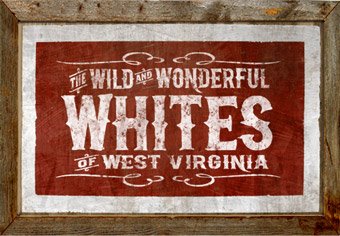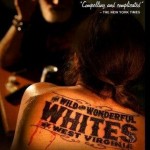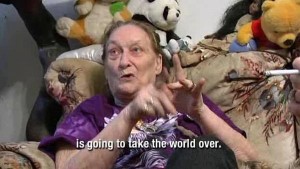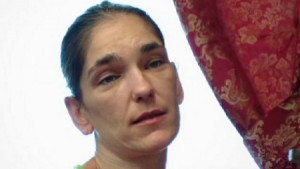
 BUY FROM AMAZON: CLICK HERE!
BUY FROM AMAZON: CLICK HERE!
STUDIO: Tribeca Film
MSRP: $2.99 Instant View
RATED: Unrated
RUNNING TIME: 89 minutes
SPECIAL FEATURES:
- My Tribeca Story
- Interview with production team
- Deleted Scenes
The Pitch
Winters Bone: The Documentary.
The Humans
Directed by Julien Nitzberg. Lived by Jesco White, Bertie May White, Mamie White, Mousie White, Sue Bob White, Poney White, Bo White, Kirk White and Hank the 3rd (naturally).
The Nutshell
The White Family of Boone County, West Virginia don’t ask a lot from this world. They want to drink their beer, snort their Oxycontin and shoot things every once and a while and as long as you don’t try and get in the way of their freedom, then you’ll be just fine. The Wild and Wonderful Whites of West Virginia chronicles a year in the life of these modern day outlaws and puts you right in the middle of their failures, their triumphs and what day to day life is like in Boone County if you’re a White. It’s okay to be scared.

"Who is? Oh, Jesus. It's the stuffed animals, isn't it? They're right behind you!!"
The Lowdown
“Sad. You know we’re all gonna die and we’re gonna all have to be risen and judged. You go this way and you go this way and you don’t live for the Lord and you gonna go that way to hell. You got a choice. He died for you on the cross, you don’t wanna serve him then when you die you’re gonna have to pay the consequences like me. I’m gonna burn like the rest, I guess. We all goin to hell. We ain’t saved. Christians. We’re hellbent. It’s scary.”
-Mamie White
It must be simultaneously wonderful and awful to be a White. Everyone in Boone County, West Virginia knows who you are and looks at you as a local embarrassment but, on the same hand, you’ve got Hank Williams the 3rd and The Kentucky Headhunters writing songs about you and how amazing it must be to be an outlaw and free in 2011. The problem for me is that the documentary The Wild and Wonderful Whites of West Virginia doesn’t really portray them as outlaws so much as drug addled and depressed hillbilly’s who are living their own posthumous legend instead of their lives. The film doesn’t pity them, but it’s not interested in helping us understand them, either.
During one of his more lucid moments, Jesco White (arguably the most famous White due to his Hank III connection and a previous documentary made about his native Appalachian clog dancing) makes a comment that he feels like he’s already dead and watching his legend unfold before him and sometimes he has to ask himself whether it’s his fame making things happen or some sort of memory of when he was alive that he’s witnessing. It’s a haunting moment as he looks into the camera, watery eyed, almost beseeching the viewer or even the cameraman to let him in on the secret of whether or not he’s a ghost. More than anything that’s the feeling that I got from this documentary: That because the White Family is alive to see their outlaw ways become legend, they’re stuck in this never ending cycle where they repeat all the same mistakes over and over because it’s expected of them. They’re always expected to resort to violence or childish behavior to fix a situation, so nothing is ever fixed, only put off until it tries to bite their hand off again. The Whites are their own worst enemy and best friend rolled up into a package of birthday parties and shootouts; death threats and worshiping Jesus; entitlement and destitution.

My kind of party. Pickin and a'clickin, son.
The patriarch of the White family was D. Ray White, the inventor of 35 Appalachian Mountain dance steps never seen before his day. He was a genius when it came to defrauding the system and had some of his kids receiving Social Security checks by the time they were 11 years old. Working in the coal mines of West Virginia for the early years of his life he saw the blatant disregard the mining companies had for their workers and for following the laws that protected the common man from being consistently and energetically screwed by corporate interests. So D. Ray decided to screw back by getting all of his children and grandchildren subsidized by a government that ignored him and rejected him on a daily basis. To this day the White’s receive Social Security checks, disability checks and vouchers for medication from the state whether they should be eligible or not and it’s created a sense of entitlement with the Whites that’s almost breathtaking to behold.
There is an impunity to almost everything they do, as if consequences could never actually catch up to them because “We’re the Whites, goddammit.” But the law doesn’t care who they are and after almost every scene of them raising their hackles at the world and just plain being a White, there’s a scene with them wide eyed with disbelief as they head into court to face charges or have to fight to get one of their babies back from social services. Kirk White gives birth to a beautiful baby girl and then a few hours later is snorting Hillbilly Heroin off of the bedside table in her hospital room with the baby a few feet away, staring at the ceiling, already addicted to all the drugs Kirk was taking while pregnant. When she tries to leave, the doctors tell her the baby isn’t doing very well and needs to stay for a few more days. Three days later when Kirk returns for the baby (that everyone still calls “it”), she’s with social services and Kirk’s not allowed to see her child or be anywhere near it. As she sits in her car, wailing and talking about walking into traffic, you really do pity her and the sense of entitlement she has for thinking she can keep snorting Oxy while pregnant and not face some sort of consequences (whether it be fetal abnormalities or the state realizing you’re an unfit parent), but it’s also hard not to feel like we should be shouldering some of the blame ourselves. That could just be my white, liberal guilt talking, though.
Johnny Knoxville and Jeff Tremaine produced this film and Hank III pops up a few times to play songs he wrote about the Whites and also to talk about them, as he’s considered a family friend. The fame the Whites have been given (through their documentaries and famous friends) has only added onto the entitlement they received from basically being state subsidized from an early age and created an entire family that’s one giant Frankenstein’s Monster. I don’t mean that as an insult, but as more of a statement on America’s culture of celebrity and how sometimes the least deserving (or prepared) of us get thrust into a spotlight that only wants us in order to terrorize us and humiliate us. By making the Whites celebrities, we’re telling them that we approve of their outlaw standard of life and for them to keep doing it so we can keep laughing and sitting there with slack jawed wonder at their daring and hubris. I’m not saying that they’re not responsible for their own actions, but there’s thousands of people just like the Whites out there living off the government and fighting and fucking. Why are the Whites special enough to be thrust out of their isolation into the national spotlight? By perpetuating their celebrity we’re killing them quicker than they would on their own. By allowing us access into their small corner of the world, they have ceased to be a controlled experiment and now we’re stepping on butterflies in 10,000 B.C. and wondering why the future is changing.
None of this speaks to whether the documentary is good, which it is. It’s an 89 minute dance of fascinating and depressing imagery combined with interviews with people who probably should have just been left alone. There’s no real thesis to the film, which makes it feel episodic instead of rambling as it should have felt. Honestly, the doc could have used another 20 minutes to really bring us into this world and unsettle us with all the craziness we’re afforded by peeking through the crusty window into these people’s lives. The film is never judgmental of the Whites and none of it ever feels like Rednecksploitation, which would have been a tone it very easily could have achieved. Instead, it’s a fairly unflinching view of a family we didn’t give birth to, but we created all the same. As Jesco says in the film “We’re all living just like it’s a story.” He’s not wrong. It is just a story to Jesco, one where he gets to wake up in the morning and be famous just for being himself. No matter whether that self is a fighter, a killer, a dancer or a drunk, we’re going to keep him in the lifestyle he’s grown accustomed to. No matter what.

Dad?
Interviewer: “Do you think life is a good thing or a bad thing?”
Mamie White: I ain’t never fucked a sin that been good. Come in this world with nothin guess I’ll die with nothin. But at least the world knows who the fuck we are.”
The Package
It’s a typical Tribeca Film release with bare bones special features and constant advertising for American Express. The interview with Knoxville and the director is 3 minutes long and interesting since it seems like the director was fascinated by the Whites as humans, whereas Knoxville was aroused by the danger making the movie might entail. There are quite a few deleted scenes which are nice, but none of real consequence. The transfer is nice and the sound is good and clean. Middle of the road release, all told.
Rating: 




Out of a Possible 5 Stars
